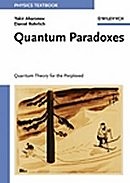|
Quantum Paradoxes: Quantum Theory for the Perplexed
|
|
Yakir Aharonov, Daniel Rohrlich
|

|

Yakir Aharonov is one of the pioneers in measuring theory, the nature of quantum correlations, superselection rules, and geometric phases and, as such, has made monumental contributions to theoretical physics. Together with Daniel Rohrlich of the Weizmann Institute, Israel, he has written here a groundbreaking work on the remaining mysteries of quantum mechanics. With both students as well as researchers in mind, the authors provide an insight into that part of the field that led Feynman to declare "nobody understands quantum mechanics".
From the contents:
* The use of paradox
* How to weigh a Quantum
* Is Quantum Theory complete?
* Phases and Gauges
* Modular variables
* Nonlocality and Casuality
* Quantum Measurements
* Measurement and Compensation
* Quantum Cats
* A Quantum Arrow of Time?
* Superselection Rules
* Quantum Slow Dance
* Charges and Fluxons
* Quantum Measurements and Relativity
* How to Observe a Quantum Wave
* Weak Values
* Weak Values and Entanglement
* The Quantum World
Yakir Aharonov is Emeritus Professor of Physics at Tel Aviv University in Israel and also Professor of Physics at the University of South Carolina. His investigations into fundamental aspects of quantum theory, including the Aharonov-Bohm effect, have influenced many fields of physics and opened up the new field of mesoscopic physics. Professor Aharonov has won numerous prizes, including the 1989 Israel National Prize, the 1991 Elliot Cresson Medal of the Franklin Institute, and (with Michael Berry) the 1995 Hewlett-Packard Europhysics Prize and the 1998 Wolf Prize in physics. He is a member of the US National Academy of Science and that of Israel.
Daniel Rohrlich is a staff scientist at the Weizmann Institute of Science in Israel, and has taught at several Israeli universities and colleges. He received his doctorate in physics from the State University of New York at Stony Brook in 1986. His research includes path integrals, fundamental aspects of quantum mechanics, quantum information theory, and experimental mesoscopic physics.
|
|
